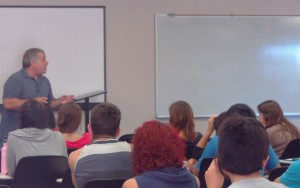
Marcell DuGuerre teaching a critical thinking philosophy class. This same general education course is now offered online throughout the CSU system as part of the intrasystem concurrent enrollment program.
A Chico State online critical thinking course is being offered across the California State University system as part of a multi-million dollar effort toward technological solutions that aim to increase student success.
This mass adoption is part of an effort by the chancellor’s office to redesign bottlenecked courses with an emphasis on online accessibility. The CSU is giving $10 million to CSU campuses during the 2013-14 academic year for the redesign.
The term bottleneck refers to any obstacle that limits a student’s ability to make progress toward a degree, such as courses with high failure rates, a lack of required classes at a particular campus or limitations on properly equipped facilities.
Wai-hung Wong, a philosophy professor, has been teaching an online version of his critical thinking class for about four years.
His class was chosen by the chancellor’s office as one of six courses that is considered an exceptional example for course redesign. This means the student success outcomes produced in the online environment were equivalent or higher when compared to the same class in a traditional setting.
Faculty members from other campuses came to Chico State this summer to learn from Wong’s experiences.
“The summer eAcademy at Chico State was basically a workshop for faculty members from other campuses to explore the possibility of offering an online critical thinking course,” Wong wrote in an email to The Orion.
These six proven classes are now being offered across the CSU system in a program called intrasystem concurrent enrollment, also known as ICE. As of Sept. 6, about 160 students had enrolled in these courses. Wong is teaching one online course with about 26 students, some of which are from other CSU campuses.
Chico State Provost Belle Wei, who has worked closely with the chancellor’s office, said that Chico State can expect to see this program grow in the future, as more bottleneck courses are redesigned and evaluated to see if they have the same success rates.
“For instance, sometimes a particular course is not offered because we don’t have enough enrollment,” Wei said. “These kind of ICE courses may be beneficial to our students because then they can take it online so the schedule will be more flexible for them.”
The critical thinking class is not a bottleneck for Chico State, but Wong’s success may help alleviate the lack of effective classes in the CSU system, said Ed Pluth, the chair of the philosophy department.
“There are other campuses that can’t offer enough sections of critical thinking and everyone has to have one for general education, so that is why the chancellor’s office was interested in doing something,” Pluth said.
The university’s approach to online courses is informed by what are recognized as the best practices for effective teaching and student learning, wrote Chico State President Zingg in an email to The Orion.
“These best practices inform the technology we choose to deliver the courses,” Zingg wrote. “We do not choose the technology first then fit course content to it.”
Bill Hall can be reached at [email protected] or @thebillhall on Twitter.








